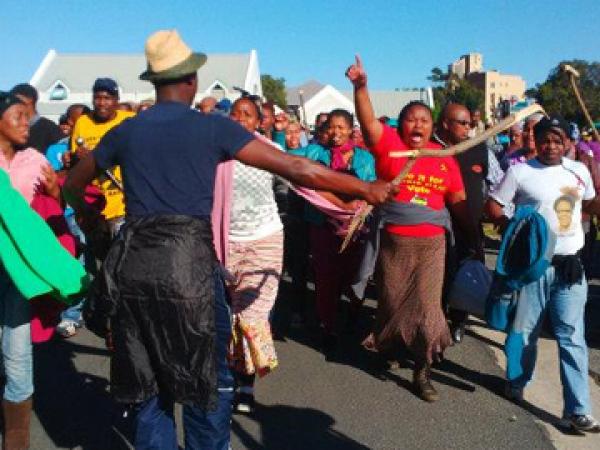Lwandle: too much acrimony, too little understanding

The house demolitions and evictions that took place in Strand last week highlighted the class and race fractures that run through our country.
Several hundred desperately poor black people had their shacks torn down and were dispossessed of their meagre belongings during a bitterly cold and wet Cape Town winter. Their removal by SANRAL was possibly unlawful as Pierre de Vos has argued. Alongside where they lived is the predominantly white Strand Ridge community, who were worried about the effect of a recently erected informal settlement on their property values and living conditions. And when a SANRAL owned field in Blackheath, some 20 kilometres away, was touted as a place to move the evicted residents, the coloured community that would be their new neighbours reacted angrily.
While SANRAL has said the evictions were carried out to make way for an N2 bypass, this seems unlikely. If you look at a map of the surrounding area, it’s unclear where such a bypass would go, or how many other people would have to be evicted to make it possible. We know from court papers and correspondence that there was pressure on SANRAL from the Strand Ridge residents as well as the City of Cape Town to remove the informal settlement. But the court papers that we have seen do not contain an N2 bypass plan.

Google Earth view of the eviction site and the N2. Screen capture by Adam Armstrong.
The actions of these three communities should be understood. The people of Nomzano need a place to stay, and opportunities for work, health-care and education. The residents of Strand Ridge are not wealthy; they have legitimate concerns about living next to an informal settlement. So too the current residents of Blackheath. There are no easy solutions to the housing crisis in Cape Town, or anywhere else in the country.
This is why it was particularly important for the various parties responsible for Nomzamo to have worked very hard together to come up with a workable way forward. Instead, from national government, SANRAL, the City of Cape Town, the ANC, the DA and Ses’Khona there appear to have been agendas and agendas within agendas. The consequences were disastrous for the residents of Nomzamo.
There are many unanswered questions:
Why did SANRAL and the Sheriff of the Court carry out the evictions at this time of the year when no alternative living arrangements had been made?
Why were the residents’ belongings taken, even when some begged to keep them?
Were the evictions indeed unlawful? If so, why weren’t the residents immediately moved back to where they lived last week, their possessions returned and some compensation paid, at least until there’s a better long-term solution?
What efforts, prior to the evictions, were made by all three spheres of government and SANRAL, in consultation with the Nomzamo residents, to find an alternative, permanent, acceptable piece of land? The public record currently shows legal threats, court cases and acrimony, not solution-finding.
While the City and national government have both laid the blame with each other and SANRAL, law enforcement from both arms of government took part in the evictions. Were the Minister of Police and Mayco Member for Safety and Security unaware of what was to transpire? If they were not, why not? If they were, why didn’t they take action to protect the Nomzamo residents from a clearly inhumane act?
Many residents pay a R25 fee to Ses’Khona which is supposed to include legal representation. What legal action has been taken in support of the residents? Also, Ses’Khona t-shirts have President Zuma printed on them; what is the relationship between Ses’Khona and the ANC?
Housing Minister Lindiwe Sisulu is establishing an enquiry into what happened. This is a good idea, if such an enquiry can answer the above questions fairly and propose mechanisms to reduce the likelihood of inhumane evictions, which occur countrywide and frequently. However, the enquiry must be run by people respected by all sides and perceived to be disinterested, else it will just add to the acrimony and chaos. If the enquiry is merely a political game then, as always, the people who will lose out most will be the poorest: the shack dwellers. But all the other communities involved will also be harmed.
Geffen is the editor of GroundUp.
Support independent journalism
Donate using Payfast

Don't miss out on the latest news
We respect your privacy, and promise we won't spam you.
Next: Who are the real Invaders
Previous: Jozi: A Novel : a glimpse through a scratched looking glass

This article is licensed under a Creative Commons Attribution-NoDerivatives 4.0 International License.
